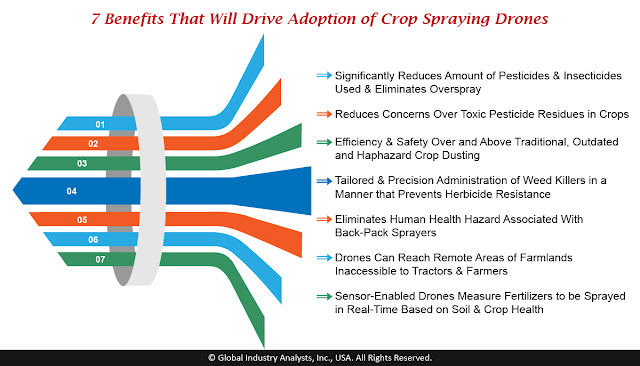The global market for Agricultural Sprayers is projected to reach US$2.9 billion by 2025, driven by growing food security concerns and the ensuing focus shed on yields and crop productivity. Sprayers are essential piece of farm equipment that plays a key role in influencing effective crop production. Defined as implements used on farms to spray pesticides, herbicides, fungicides, defoliants and water, agricultural sprayers are ubiquitous farm equipment. Machine-operated sprayers are growing in popularity against the backdrop of the strong emphasis laid on mechanization. Given that the most important goal in agriculture is ensuring uniform distribution of fertilizers and pesticides throughout the crop foliage, there is significant R&D activity focused on developing innovative sprayers that save time, manual labor, and achieve consistent spray coverage with as little chemicals as possible. Given the growing environmental and health concerns associated with pesticides, overdosing or overspraying is emerging into an expensive mistake for farmers resulting in pesticide wastages, aggravation of the risk of groundwater contamination and increased pesticide residues on crops over the permissible limit. The scenario therefore offers strong opportunities for innovative sprayers especially as “Agriculture 4.0” hits major countries worldwide. Poised to benefit in this regard is the adoption of crop spraying drones, also known as, agri-copter. Key benefits offered by these drones include significantly reduction the amount of pesticides and insecticides used; elimination of overspray; reduced concerns over toxic pesticide residues in crops; efficiency and safety over and above traditional, outdated and haphazard crop dusting; tailored and precision administration of weed killers in a manner that prevents herbicide resistance; eliminates human health hazard associated with back-pack sprayers; ability to reach remote areas of farmlands inaccessible to tractors and farmers; sensor-enabled drones measure fertilizers to be sprayed in real-time based on soil and crop health. Read More…
The global market for Agricultural Sprayers is projected to reach US$2.9 billion by 2025, driven by growing food security concerns and the ensuing focus shed on yields and crop productivity. Sprayers are essential piece of farm equipment that plays a key role in influencing effective crop production. Defined as implements used on farms to spray pesticides, herbicides, fungicides, defoliants and water, agricultural sprayers are ubiquitous farm equipment. Machine-operated sprayers are growing in popularity against the backdrop of the strong emphasis laid on mechanization. Given that the most important goal in agriculture is ensuring uniform distribution of fertilizers and pesticides throughout the crop foliage, there is significant R&D activity focused on developing innovative sprayers that save time, manual labor, and achieve consistent spray coverage with as little chemicals as possible. Given the growing environmental and health concerns associated with pesticides, overdosing or overspraying is emerging into an expensive mistake for farmers resulting in pesticide wastages, aggravation of the risk of groundwater contamination and increased pesticide residues on crops over the permissible limit. The scenario therefore offers strong opportunities for innovative sprayers especially as “Agriculture 4.0” hits major countries worldwide. Poised to benefit in this regard is the adoption of crop spraying drones, also known as, agri-copter. Key benefits offered by these drones include significantly reduction the amount of pesticides and insecticides used; elimination of overspray; reduced concerns over toxic pesticide residues in crops; efficiency and safety over and above traditional, outdated and haphazard crop dusting; tailored and precision administration of weed killers in a manner that prevents herbicide resistance; eliminates human health hazard associated with back-pack sprayers; ability to reach remote areas of farmlands inaccessible to tractors and farmers; sensor-enabled drones measure fertilizers to be sprayed in real-time based on soil and crop health. Read More…


Comments
Post a Comment